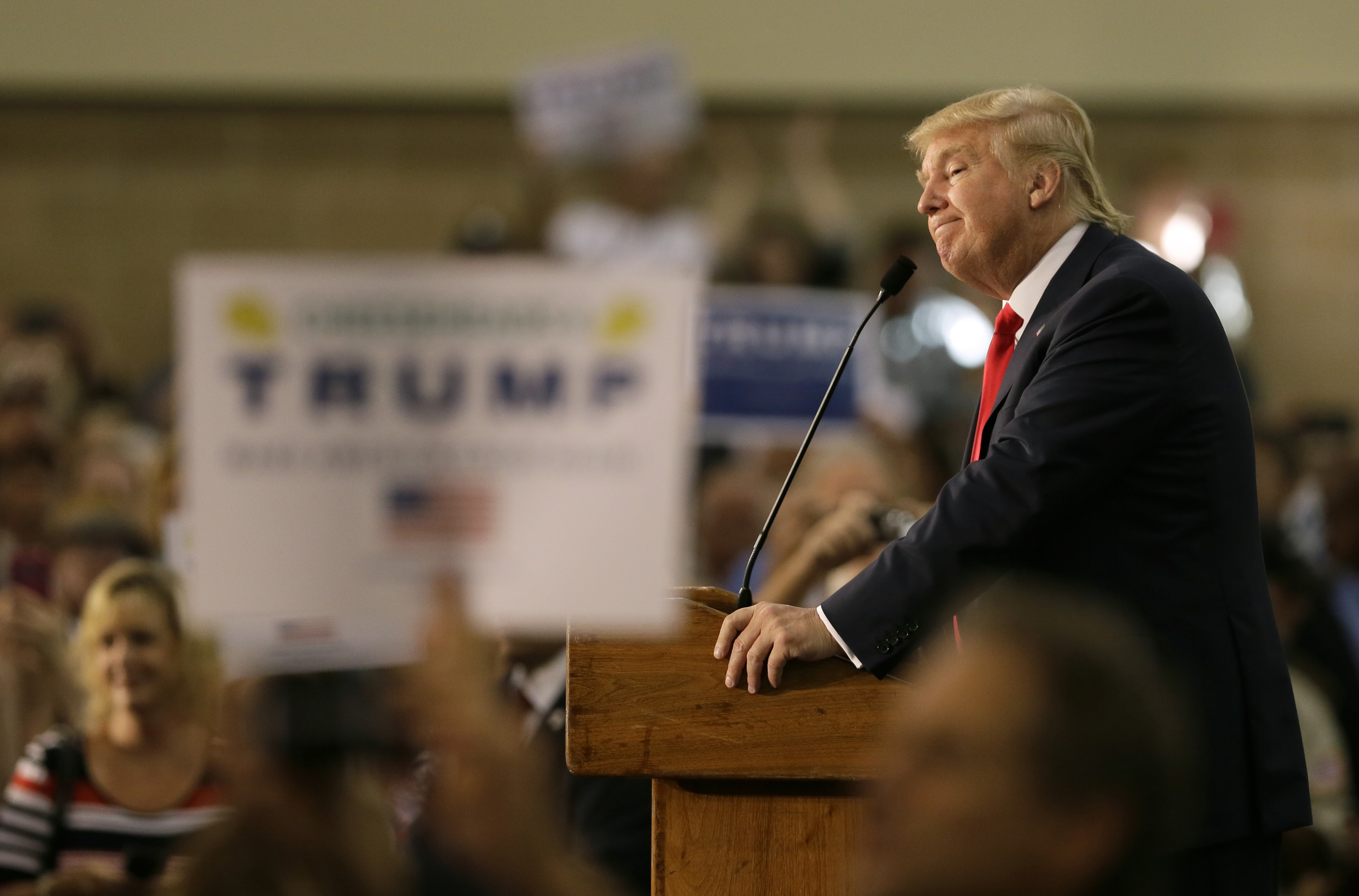Why not Donald Trump?
Seriously. Are the other candidates demonstrably that much better?


Why not Trump?
I'm surprised to be asking myself that question, since I never seriously considered the Donald in, well, any capacity. (As in: I literally have barely ever thought about him over the past 30 years, and never seriously.) And for months I was convinced, along with most informed observers, that Trump was a vanity candidate who would go nowhere — or, at best, would make a Herman Cain-style lunge for the brass ring then crash to Earth well before any voting takes place.
But the scales have fallen from my eyes. And in the interests of spreading the blessings of enlightenment, I ask the question again:
The Week
Escape your echo chamber. Get the facts behind the news, plus analysis from multiple perspectives.

Sign up for The Week's Free Newsletters
From our morning news briefing to a weekly Good News Newsletter, get the best of The Week delivered directly to your inbox.
From our morning news briefing to a weekly Good News Newsletter, get the best of The Week delivered directly to your inbox.
Why not Trump?
It can't be that he lacks experience. He has more experience as an executive (in a business context, of course) than most candidates — certainly more than our current president had when he ran. And the citizens of Minnesota, California, and New York City survived, and even thrived, under the likes of Gov. Jesse Ventura, Gov. Arnold Schwarzenegger, and Mayor Michael Bloomberg, all of whom made (if less obnoxiously) the same kinds of arguments that Trump is making now about the virtue of being a wealthy and famous political novice.
It can't be that he's too much of a hard-right conservative — among other things, because he isn't one, even if his immigration plan is extreme. Nor can it be that he has changed his political positions one too many times — after all, that didn't stop the GOP from nominating Mitt Romney last time around.
Sure, he's a crony capitalist whose success depended on his connections and astute manipulation of the law (including the bankruptcy code). But how is that attack going to sound coming from Hillary Clinton or Jeb Bush?
A free daily email with the biggest news stories of the day – and the best features from TheWeek.com
Is it really too risky to have a commander-in-chief who says he would not rip up the Iran deal and would not make stronger moves against Vladimir Putin in Ukraine unless our European allies ask us to — and yet soberly sensible to elect the chief architect of the Libyan debacle or a candidate who thinks it's a good idea to trumpet Paul Wolfowitz as one of his key advisers?
Or are we going to say we can't elect him because he's a jerk and a blowhard and has said awful things about women? Really? More awful than the things Rick Santorum and Mike Huckabee have said about gay people? More inflammatory than the things virtually every Republican candidate has said about Russia or Iran? (I'll take a leader who believes "Persians are great negotiators" over "Iran is run by a messianic suicide-cult" any day.) Or because he's a man with terrible taste? You don't think Trump would actually build a classier ballroom than Washington's got now? Have you been to Washington lately?
Yes, Trump is basically executing a hostile takeover of the Republican Party. Is that supposed to make the civic-minded shudder? Does the Republican Party strike you as a particularly civic-minded organization? Is there any organization you can name more deeply deserving of being hostilely taken over in this manner?
Conor Friedersdorf asks why Trump supporters think Trump will treat them better than conventional politicians have given that his agenda has been utterly self-centered in the past. But that's the wrong question. In his vanity, his self-centeredness, his egomania, Trump is very much a conventional politician. Few people run for high office because they are determined to accomplish a specific agenda. Most run for office because they see themselves as the man in the arena. Donald Trump is just particularly good at projecting the image that he is that man.
Friedersdorf does ask some very good questions about whether Trump actually has any of the necessary skills to "make America great again," as he aims to do:
Trump has made clear that his negotiating prowess relies heavily on leverage: the billions he has, the politicians he has bought, his mastery of U.S. bankruptcy laws, his high-priced lawyers. But foreign leaders aren't intimidated by his billions; his lawyers can't sue them into submission; he doesn't have any Chinese politicians in his pocket; and in negotiations with the Chinese, he'll have no more and no less leverage than any other American president. [The Atlantic]
All of that is fair. But consider another perspective. Trump has articulated a vision of what the president's job is, and that is to be the chief negotiator for the United States. If that's the job, who, among his competition, looks like he or she would do it better? Who has provided any evidence that he or she would do it better? Moreover, China, Mexico, and Iran aren't the only powers the next president will need to negotiate with. He or she will also need to negotiate with Congress, an entity whose unpopularity rivals those foreign powers. Who's going to do a better job than Trump negotiating with them? (Or — and this is at least as likely — hastening our descent into outright Caesarism by dispensing with Congress altogether?)
The candidate who seemed to me best-placed to make that particular sale back before Trump took off was Scott Walker, public-sector union slayer. But Walker has proved singularly incapable of capitalizing on his natural advantages, and it's not surprising to me that no competing candidate has suffered more from Trump's ascent than Walker has.
Still, that's the sale that needs to be made. Though immigration is the major issue that brought Trump greater attention, Trump's appeal is not primarily issues-based. Amusingly but unsurprisingly, it's character-based. Trump calls himself a winner, and presents himself as someone who truly lives by the old "Red" Sanders credo. If you think many of our national problems are due to refusing to think in "we win-they lose" terms, then why not elect someone who plainly thinks that way — because that's the way he's lived his whole life, virtually all of it in the public eye?
Donald Trump's greatest weakness as a candidate has always been the utter ridiculousness of the proposition. Now that he is actually a plausible contender for the presidency, either as a Republican or as an Independent, it will take more than derision to beat him. It may take an actual reason why he would be a worse president than another contender — and a reason that resonates with the broad swath of Americans who are not wedded to the core ideological commitments of either of our major parties.
So? Why not Trump?
Noah Millman is a screenwriter and filmmaker, a political columnist and a critic. From 2012 through 2017 he was a senior editor and featured blogger at The American Conservative. His work has also appeared in The New York Times Book Review, Politico, USA Today, The New Republic, The Weekly Standard, Foreign Policy, Modern Age, First Things, and the Jewish Review of Books, among other publications. Noah lives in Brooklyn with his wife and son.
-
 Bari Weiss’ ‘60 Minutes’ scandal is about more than one report
Bari Weiss’ ‘60 Minutes’ scandal is about more than one reportIN THE SPOTLIGHT By blocking an approved segment on a controversial prison holding US deportees in El Salvador, the editor-in-chief of CBS News has become the main story
-
 Has Zohran Mamdani shown the Democrats how to win again?
Has Zohran Mamdani shown the Democrats how to win again?Today’s Big Question New York City mayoral election touted as victory for left-wing populists but moderate centrist wins elsewhere present more complex path for Democratic Party
-
 Millions turn out for anti-Trump ‘No Kings’ rallies
Millions turn out for anti-Trump ‘No Kings’ ralliesSpeed Read An estimated 7 million people participated, 2 million more than at the first ‘No Kings’ protest in June
-
 Ghislaine Maxwell: angling for a Trump pardon
Ghislaine Maxwell: angling for a Trump pardonTalking Point Convicted sex trafficker's testimony could shed new light on president's links to Jeffrey Epstein
-
 The last words and final moments of 40 presidents
The last words and final moments of 40 presidentsThe Explainer Some are eloquent quotes worthy of the holders of the highest office in the nation, and others... aren't
-
 The JFK files: the truth at last?
The JFK files: the truth at last?In The Spotlight More than 64,000 previously classified documents relating the 1963 assassination of John F. Kennedy have been released by the Trump administration
-
 'Seriously, not literally': how should the world take Donald Trump?
'Seriously, not literally': how should the world take Donald Trump?Today's big question White House rhetoric and reality look likely to become increasingly blurred
-
 Will Trump's 'madman' strategy pay off?
Will Trump's 'madman' strategy pay off?Today's Big Question Incoming US president likes to seem unpredictable but, this time round, world leaders could be wise to his playbook



